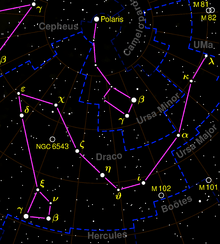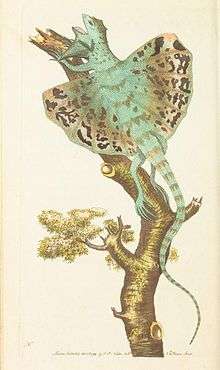Definify.com
Webster 1913 Edition
Draco
Webster 1828 Edition
Draco
DRACO
,Noun.
1.
In astronomy, a constellation of the northern hemisphere, containing according to Flamstead, eighty stars.2.
A luminous exhalation from marshy grounds.3.
A genus of animals of two species. [See Dragon.]Definition 2026
Draco
Draco
See also: draco
Translingual
Etymology
Proper noun
Draco m
Hypernyms
- (genus): Reptilia - class; Eureptilia, Romeriida - clades; Diapsida - subclass; Lepidosauromorpha - infraclass; Lepidosauria - superorder; Squamata - order; Sauria - suborder; Iguania - infraorder; Agamidae - family; Agaminae - subfamily
Hyponyms
- (genus): Draco volans - type species
English

Draco and nearby constellations
Proper noun
Draco
- (astronomy) A circumpolar constellation of the northern sky, said to resemble a dragon. It features a line of stars (including Thuban) that winds between Ursa Major and Ursa Minor.
- The name of an Athenian lawgiver, known for the severity of his laws.
- (Greek mythology) One of Actaeon's hounds.
Derived terms
Translations
constellation
Athenian lawgiver
one of Acteon's hounds
|
Related terms
See also
Latin
Proper noun
Dracō m (genitive Dracōnis); third declension
Descendants
- English: draconian
References
- Draco in Charlton T. Lewis and Charles Short (1879) A Latin Dictionary, Oxford: Clarendon Press
- Félix Gaffiot (1934), “Draco”, in Dictionnaire Illustré Latin-Français, Paris: Hachette.
draco
draco
See also: Draco
Latin
Alternative forms
Noun
dracō m (genitive dracōnis); third declension
- A dragon; a kind of snake or serpent.
- The standard of a Roman cohort, shaped like an Egyptian crocodile ('dragon') head.
- The astronomical constellation Draco.
- (ecclesiastic) The Devil.
Usage notes
Draco usually connoted larger sorts of snakes in Classical usage, particularly those which seemed exotic to the Romans. One traditional rule gives the distinction among the various Latin synonyms as anguis being a water snake; draco being a "temple" snake, the sort of large, exotic snake associated with the guardianship of temples; and serpens being a common terrestrial snake. This rule is not universally credited, however.[1]
Inflection
Third declension.
| Case | Singular | Plural |
|---|---|---|
| nominative | dracō | dracōnēs |
| genitive | dracōnis | dracōnum |
| dative | dracōnī | dracōnibus |
| accusative | dracōnem | dracōnēs |
| ablative | dracōne | dracōnibus |
| vocative | dracō | dracōnēs |
Derived terms
Derived terms
|
Descendants
See also
References
- draco in Charlton T. Lewis and Charles Short (1879) A Latin Dictionary, Oxford: Clarendon Press
- draco in Charlton T. Lewis (1891) An Elementary Latin Dictionary, New York: Harper & Brothers
- DRACO in Charles du Fresne du Cange’s Glossarium Mediæ et Infimæ Latinitatis (augmented edition, 1883–1887)
- Félix Gaffiot (1934), “draco”, in Dictionnaire Illustré Latin-Français, Paris: Hachette.
- draco in The Perseus Project (1999) Perseus Encyclopedia
- draco in Harry Thurston Peck, editor (1898) Harper's Dictionary of Classical Antiquities, New York: Harper & Brothers
- draco in William Smith., editor (1854, 1857) A Dictionary of Greek and Roman Geography, volume 1 & 2, London: Walton and Maberly
- draco in William Smith et al., editor (1890) A Dictionary of Greek and Roman Antiquities, London: William Wayte. G. E. Marindin
- ↑ James Fergusson, Tree and serpent Worship, or illustrations of mythology and art in India in the 1st and 4th cent. a. Chr, London: Allen and Co.,1868, page 13 (note).
